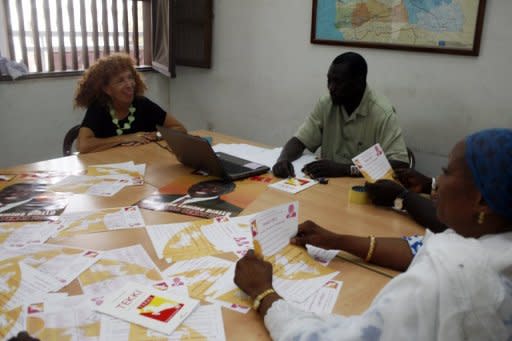Women to get equal shot in Senegal elections
Senegal will vote for new lawmakers in an election Sunday set to put more women than ever in the national assembly thanks to a new law which requires an equal gender balance on party lists. The polls come three months after Macky Sall won presidential elections, evicting ex-president Abdoulaye Wade after 12 years in office, and the new leader needs a majority to put his new policies into action. In 2010 a law pushed by Wade was adopted requiring strict gender parity in all elected offices and this is the first legislative election in which it comes into play. Women's organisations have praised the move as modern, while others in the majority Muslim, male-dominated nation have rejected it as unfair and undemocratic. Parties and coalitions have submitted 24 lists for Sunday's election which will renew 150 seats in the assembly for five years. More than 7,000 candidates are in the running, half of whom should be women. Gender parity "will bring our country in line with more modern nations and democratic governance," said Fatou Sow Sarr, director of a gender institute at the University of Cheikh Anta Diop in Dakar. "We cannot speak of democracy if the two essential components of a society, men and women, are not part of the process." Only 33 of the outgoing lawmakers are women in a country whose population of 12 million is 52 percent female. Since independence only one woman, Mame Madior Boye, served as prime minister, between March 2001 and November 2002. The United Nations Development Programme in 2010 warned that women were falling behind as fewer and fewer were being elected to parliaments in Africa. The African Union target is 50 percent. Rwanda is leading the continent in women's representation, with 56 percent female lawmakers, followed by South Africa at 46 percent. While Senegal is hoping to advance into these ranks, some critics, such as religious leader and lawmaker Mbaye Niang, said the law is "unfair and undemocratic." "Women are being chosen because they are women and not by merit. All the parties have had trouble drawing up their lists. There are not a lot of educated women on the ground." In the national assembly, 60 members are elected through proportional representation and the other 90 from constituency lists by majority vote. Some 5.3 million people have registered to vote in the election after a three-week campaign which went off without major incident, compared to the presidential election which was tarnished by deadly riots during campaigning. The violence was sparked by 86-year-old Wade's insistence on seeking a third term in office. However, he was trounced at the ballot box as voters handed the much-younger Sall, 50, a resounding victory. But now Sall needs seats in parliament to carry out his programmes. "A president without a majority cannot govern and we would find ourselves at an impasse," he said recently, calling for voters to back the "Benno bokk Yaakkar" ('United for the same hope' in the Wolof language) coalition. Among his main competitors are Wade's Senegalese Democratic Party (PDS), which is back in the opposition, and a coalition formed by a group of PDS dissidents called "Bokk gis gis" (Common Vision). The opposition have called for Sall to be "forced into cohabitation" in parliament. "If the president does not have a parliamentary majority, the opposition will name a prime minister and form a government. For him to govern comfortably, he needs this majority," said lawyer Ismaila Madior Fall. The last legislative polls were boycotted by the opposition who demanded electoral reforms, and is thus dominated by the PDS, despite many defections since Wade's loss. The polls come as Sall's government has launched an audit into the management of the former regime which has seen top officials hauled in for questioning.




